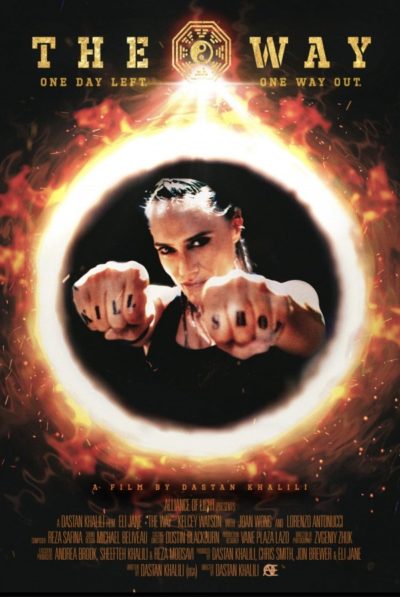★★★½
“…the size of the fight in the dog.”
 Cross another country off the map: Guatemala, in this case. I should probably start by explaining the title. The “cadejo” is a dog-like spirit from local folklore, which comes in two varieties. The black (negro) one is malicious, appearing to and trying to kill travellers, while the white (blanco) is benevolent. According to Wikipedia, it “protects people, including drunks, vagabonds, and people with grudges from all evil. Emphasis added, because now and again in this, there appears to be one watching over the grudgeful heroine here, Sarita (K. Martínez). She is on the hunt for her sister, Bea (P. Martínez – maybe they’re real sisters?), who vanishes one night, after the siblings have an argument at a local nightclub.
Cross another country off the map: Guatemala, in this case. I should probably start by explaining the title. The “cadejo” is a dog-like spirit from local folklore, which comes in two varieties. The black (negro) one is malicious, appearing to and trying to kill travellers, while the white (blanco) is benevolent. According to Wikipedia, it “protects people, including drunks, vagabonds, and people with grudges from all evil. Emphasis added, because now and again in this, there appears to be one watching over the grudgeful heroine here, Sarita (K. Martínez). She is on the hunt for her sister, Bea (P. Martínez – maybe they’re real sisters?), who vanishes one night, after the siblings have an argument at a local nightclub.
Sarita had just discovered Bea had been seeing a gang-banger, Andrés (Rodriguez), who worked on the weekend there as a barman. She goes to his home town where he operates, and infiltrates the gang, seeking to find out what happened to Bea. Gaining their trust is not easy: she has to act as bait, luring a rival of the group’s boss into a hotel for an assassination attempt. She then discovers Bea may have been abducted by another gang operating in the area, and volunteers for a more active role in the next murder. What price is she willing to pay, in order to discover the truth about Bea’s fate, and make those responsible pay for their involvement?
The common theme here is everyone underestimating Sarita, and how far she will go to achieve her aims. The most obvious culprit is the first target, who sees in her only a fresh whore to bed. It’s a superbly tense sequence, beginning with an extended single shot of her arriving at and exploring the club where the target is located. It then becomes increasingly fraught as he first wants to take her home rather than the designated hotel – and it turns out he has a room there already. You’ll find yourself holding your breath as Sarita has to improvise: what she may lack in experience, she makes up for in quick thinking. And, by the end, in her utter ruthlessness, again underestimated by her victim.
At 126 minutes, it could perhaps use some tightening. However, it’s rarely boring, simply as a depiction of existence at the bottom of society, where life is disposable. As Andrés’s friend Damian (López) says to Sarita, if any of them die, “Nobody will care. We don’t matter to anyone. They’ll all be very happy we’re dead.” Lerner used a lot of non-professional actors, some of whom had first-hand experience of gang life, and the resulting authenticity powers the film through the choppier waters it sometimes encounters. I would recommend not investing too much in Bea’s fate, since the specifics are never detailed. Yet it isn’t the point. This is Sarita’s story, and by the end, she’s far from the brave innocent we met at the beginning.
Dir: Justin Lerner
Star: Karen Martínez, Rudy Rodriguez, Pamela Martínez, Brandon López





 This rather gloomy slice of social science-fiction seems to take place in a post-apocalyptic version of Canada, albeit a fairly low-key apocalypse. It seems to have led to a rigidly class-based system, with a sharp division between “citizens” and the rest. That leaves the indigenous population on the outside, scrabbling hard to survive and avoid having their kids “re-educated” in military-style academies. [This pointedly echoes
This rather gloomy slice of social science-fiction seems to take place in a post-apocalyptic version of Canada, albeit a fairly low-key apocalypse. It seems to have led to a rigidly class-based system, with a sharp division between “citizens” and the rest. That leaves the indigenous population on the outside, scrabbling hard to survive and avoid having their kids “re-educated” in military-style academies. [This pointedly echoes  If you fed an AI all the sports movies ever made, and then asked it to write a script, what you’d get is likely something close to this. Here’s a challenge: write down ten clichés you find in a film like this, then watch the movie (conveniently embedded below), and see how many show up. I’m willing to bet most of those on your list would be present here. The main saving grace is that the execution is done with a complete lack of self-awareness. It feels as if the writers genuinely had no clue they were treading a path which was more of a groove. Everyone involved in this is so earnest, it just about gets away with it.
If you fed an AI all the sports movies ever made, and then asked it to write a script, what you’d get is likely something close to this. Here’s a challenge: write down ten clichés you find in a film like this, then watch the movie (conveniently embedded below), and see how many show up. I’m willing to bet most of those on your list would be present here. The main saving grace is that the execution is done with a complete lack of self-awareness. It feels as if the writers genuinely had no clue they were treading a path which was more of a groove. Everyone involved in this is so earnest, it just about gets away with it. This animated series bears a certain resemblance to another Japanese show on Netflix, the live-action Alice in Borderland. Both are adaptations of Japanese manga series (Alice started three years earlier), which see a number of young people suddenly transported to a lethal and sparsely populated version of their city. There, they have to figure out how to survive, and what the heck is going on, in the face of enemies human and… well, not-so human. Both shows also manage to reach the end of their first series without achieving even the slightest degree of significant resolution, though the journey to reach that point is still reasonably entertaining, and certainly does not stint on the old ultra-violence.
This animated series bears a certain resemblance to another Japanese show on Netflix, the live-action Alice in Borderland. Both are adaptations of Japanese manga series (Alice started three years earlier), which see a number of young people suddenly transported to a lethal and sparsely populated version of their city. There, they have to figure out how to survive, and what the heck is going on, in the face of enemies human and… well, not-so human. Both shows also manage to reach the end of their first series without achieving even the slightest degree of significant resolution, though the journey to reach that point is still reasonably entertaining, and certainly does not stint on the old ultra-violence. I’ve read complaints that the trailer mis-sells this, over-hyping the action components. Fortunately, I went in largely blind, so had no such preconceptions. I can see how it could be fair comment: while bookended by solid action, the middle is much more an oddball Japanese comedy. [If you’d told me this was directed by Sion Sono, I’d believe you] I still found it largely engaging, while occasionally hilarious and – sometimes simultaneously – utterly baffling. It’s about two teenage assassins, Chisato (Takaishi) and Mahiro (Izawa), who have been told by their handler they need to start fending for themselves. That means moving into an apartment, and finding work which doesn’t involve killing people.
I’ve read complaints that the trailer mis-sells this, over-hyping the action components. Fortunately, I went in largely blind, so had no such preconceptions. I can see how it could be fair comment: while bookended by solid action, the middle is much more an oddball Japanese comedy. [If you’d told me this was directed by Sion Sono, I’d believe you] I still found it largely engaging, while occasionally hilarious and – sometimes simultaneously – utterly baffling. It’s about two teenage assassins, Chisato (Takaishi) and Mahiro (Izawa), who have been told by their handler they need to start fending for themselves. That means moving into an apartment, and finding work which doesn’t involve killing people. I think it has been a long time since a film has so completely yanked the carpet out from under me. We might have to go back all the way to David Lynch’s Lost Highway, and that was 1997. So it has been a while. I’m not sure if it works here. It did in Highway; I’m just uncertain whether Khalili is as good a film-maker as Lynch. It’d likely require a second viewing to decide, and I wasn’t that impressed elsewhere to justify a repeat. I will remember it though, and that’s more than can be said for many of the films I review here. So it was not a complete waste of time.
I think it has been a long time since a film has so completely yanked the carpet out from under me. We might have to go back all the way to David Lynch’s Lost Highway, and that was 1997. So it has been a while. I’m not sure if it works here. It did in Highway; I’m just uncertain whether Khalili is as good a film-maker as Lynch. It’d likely require a second viewing to decide, and I wasn’t that impressed elsewhere to justify a repeat. I will remember it though, and that’s more than can be said for many of the films I review here. So it was not a complete waste of time.  This is a sprightly and energetic Chinese knock-off, borrowing heavily from Resident Evil and Aliens in particular. There’s a research lab deep underground, in the middle of the Gobi Desert, which has suddenly gone radio silent. The research they were doing there was… well, I’m not 100% certain quite what it involved. While a lot of the dialogue in this is in “English”, I’m using quotes advisedly. Especially on the scientific front, it seems to be more of an enthusiastic word-salad, like “by chance, precise data from the gamma variable appear,” throwing jargon about radiation and DNA splicing into the mix, in lieu of anything coherent. Anyway, it seems Ohm Technology are into some fairly shady shit, to nobody’s surprise.
This is a sprightly and energetic Chinese knock-off, borrowing heavily from Resident Evil and Aliens in particular. There’s a research lab deep underground, in the middle of the Gobi Desert, which has suddenly gone radio silent. The research they were doing there was… well, I’m not 100% certain quite what it involved. While a lot of the dialogue in this is in “English”, I’m using quotes advisedly. Especially on the scientific front, it seems to be more of an enthusiastic word-salad, like “by chance, precise data from the gamma variable appear,” throwing jargon about radiation and DNA splicing into the mix, in lieu of anything coherent. Anyway, it seems Ohm Technology are into some fairly shady shit, to nobody’s surprise. When the best part of a movie is the opening credits, we have a problem. That’s the case here, with an 007-influenced montage that feels as if it cost more than the entire rest of the film to put together. However, by that point, the movie was already on thin ice, because the volume of the music was roughly three times that of dialogue in the pre-credit scene. Lunging repeatedly for the button on the remote is always a red flag for any indie movie, and proved accurate here. The same goes for the gratuitous name-checking of much better black heroines, such as
When the best part of a movie is the opening credits, we have a problem. That’s the case here, with an 007-influenced montage that feels as if it cost more than the entire rest of the film to put together. However, by that point, the movie was already on thin ice, because the volume of the music was roughly three times that of dialogue in the pre-credit scene. Lunging repeatedly for the button on the remote is always a red flag for any indie movie, and proved accurate here. The same goes for the gratuitous name-checking of much better black heroines, such as  After enjoying
After enjoying  There are times where I regret my choice of pastime. It means I end up watching things for this site that I would never give the time of day, given the choice. This is one such, having endured the almost physically painful experience which was
There are times where I regret my choice of pastime. It means I end up watching things for this site that I would never give the time of day, given the choice. This is one such, having endured the almost physically painful experience which was